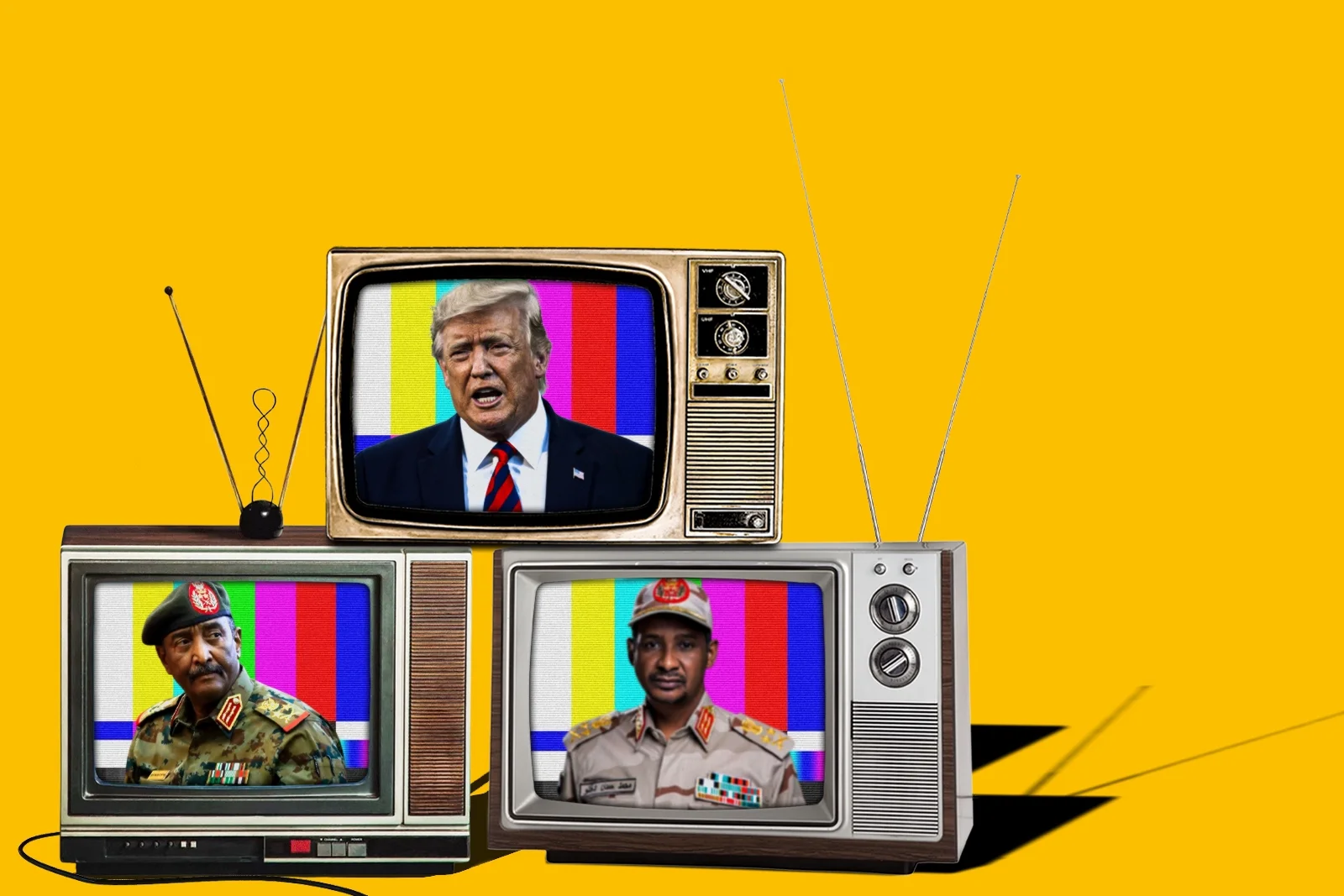
Trump Slashed Foreign Aid. Sudan is Paying the Price.
Sudan’s descent into civil war in April 2023—triggered by open conflict between the national army and a powerful paramilitary force—was less a sudden eruption than a culmination of years of mounting tensions. The Sudanese Armed Forces (SAF), led by General Abdel Fattah al-Burhan, and the Rapid Support Forces (RSF), commanded by General Mohamed “Hemedti” Dagalo, have long vied for dominance in the political vacuum left by Sudan’s fragile transitional arrangements.
The uneasy alliance, born of expediency after the ousting of longtime dictator Omar al-Bashir, collapsed in the aftermath of the 2021 military coup. By 2023, those simmering tensions exploded into a brutal and expansive war. What began as a struggle for control in the capital, Khartoum, rapidly metastasized across the country, spreading into Kordofan, Blue Nile, Western Darfur, and other volatile regions. Foreign interests have further complicated the situation by funneling arms and support to both sides, turning Sudan into a theater for regional proxy conflict.
Now, more than two years into the violence, Sudan is not merely suffering a civil war; it is experiencing what the United Nations has described as a “living nightmare.” Ceasefire attempts have consistently crumbled, infrastructure lies in ruin, and government authority has splintered. The conflict has created a spiral of debt, instability, and deepening humanitarian desperation. Collapsed public services, pulverized roads, and decimated medical systems mean that civilians are not just victims of bullets but of a comprehensive breakdown of the systems meant to sustain life. Makeshift shelters and vanishing food supplies paint a bleak picture of a country on the edge of collapse.
The human cost is staggering. Approximately 11 million people have been displaced within Sudan’s borders, while an additional 3 million have fled to neighboring countries, including Chad, Egypt, and South Sudan. This mass exodus represents the fastest and largest displacement crisis globally, yet it remains largely obscured from international view. The war has obliterated local food systems and traditional livelihoods, making nearly two-thirds of the population dependent on humanitarian aid. Of Sudan’s 48 million citizens, some 25 million face extreme food insecurity.
As of August 2024, Darfur was officially in famine. Aid workers and observers have accused both the SAF and RSF of exacerbating the food crisis by looting supplies, obstructing humanitarian convoys, and laying waste to agricultural lands. The violence has triggered a surge in civilian deaths, with an estimated 20,000 fatalities by the end of 2024, although many believe the actual figure is considerably higher due to widespread underreporting of deaths from hunger and disease.
According to multiple human rights organizations, the intensity and scope of violence are overwhelming. Ethnic cleansing in Darfur has resumed with a grim familiarity. Massacres, widespread sexual violence targeting women and girls, and systemic targeting of civilian populations are tragically commonplace. In areas most affected by fighting, nearly 70 percent of hospitals are out of service. Camps for displaced people are breeding grounds for cholera, malaria, and measles. Fuel shortages and power outages cripple relief efforts and compromise cold storage for medicine and food. The obliteration of Sudan’s already fragile healthcare, educational, and economic infrastructure has made access to essential services nearly impossible. Nearly 30 million Sudanese—more than half of the country’s population—now require urgent humanitarian assistance. Sudan today stands as a haunting monument to the cost of unchecked conflict.
The U.S. Agency for International Development (USAID) has provided Sudan with life-saving food aid, water, medical care, and shelter materials for decades. It has also helped build critical social and healthcare infrastructure, particularly in rural and underserved communities. In the midst of the conflict, USAID’s Disaster Assistance Response Team (DART) functioned remotely, coordinating relief from neighboring nations as violence engulfed Khartoum. During 2023 and 2024, the U.S. pledged hundreds of millions of dollars in humanitarian support, much of it earmarked for Sudanese refugees in surrounding countries.
However, these gains were catastrophically undercut by policy changes under the Trump administration. In 2025, a sweeping $2.5 trillion cut to the federal budget included a freeze on USAID funding. Over 5,000 contracts were terminated, effectively halting 83 percent of ongoing projects. This reversal was especially devastating for Sudan, where USAID’s long-term development initiatives had already been scaled back following the 2021 coup.
With the suspension of funding, almost 80 percent of Sudan’s 1,460 community kitchens were shuttered. These kitchens had previously provided a vital safety net for families on the brink of starvation. The elimination of such programs has left millions without even the most basic food support, drastically narrowing the scope of humanitarian assistance. Swift policy reversals and reinstated support are necessary to prevent Sudan from falling deeper into poverty and despair.
The crisis is further compounded by its near-total absence from global headlines. While the conflicts in Gaza and Ukraine have galvanized media and diplomatic focus, Sudan’s civil war has unfolded in the shadows. Its complexity, geographic remoteness, and lack of clear geopolitical stakes have rendered it nearly invisible. This silence is not benign; it is a form of complicity. The lack of international media coverage and public outcry has reduced the pressure on warring parties to negotiate and has led donor governments to de-prioritize Sudan in their humanitarian agendas. Ethnic cleansing in Western Darfur—where entire communities have been wiped out—has been met with barely a whisper of outrage.
Sudan’s economy has contracted by 40 percent since the war began, and Khartoum’s rich cultural heritage is being obliterated. UN officials warn that the country is on the verge of becoming a failed state in the most complete sense—a lawless, fragmented terrain vulnerable to transnational terrorism and possible genocide.
The ghosts of Darfur’s past now stalk the present with chilling resonance. The world’s inability to prevent the return of genocidal violence underscores a failure of empathy, diplomacy, and leadership. There is still time—if narrowing—to mitigate the unfolding catastrophe. What is required is not only an end to hostilities but a sustained international commitment to humanitarian assistance, political resolution, and accountability for war crimes. Ending the power struggle between Sudan’s armed factions must be matched by investment in the country’s human capital, its institutions, and the resilience of its people.
Sudan’s war is not simply a domestic tragedy. It is a global test. It calls into question the international community’s capacity to uphold the basic tenets of humanitarianism in an era of multiplying crises. The war’s victims—civilians, children, the displaced, the starving—deserve the same attention and urgency afforded to victims of other global conflicts. To continue neglecting Sudan is to abandon the very principles of justice and compassion that global institutions claim to uphold. If the world is serious about preventing mass atrocity, then it must treat Sudan’s suffering not as a peripheral concern but as a central challenge to our shared humanity.
The time for action is now. Only with sustained and reinvigorated international attention, diplomatic urgency, and humanitarian resolve can Sudan begin to emerge from the shadows of despair into a future where peace and recovery are even remotely possible.
